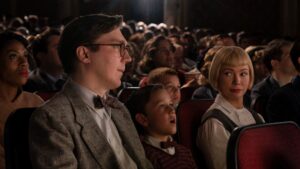
“The Fabelmans” is nostalgia, Spielberg-style. It’s essentially his origin story in the person of young Sammy Fabelman. As the story opens, it’s 1952 and he’s attending his first movie, Cecil B. DeMille’s overblown epic, “The Greatest Show On Earth.” Sammy is taken by everything he sees on the screen — in particular the train crash towards the end.
When his parents give him a Lionel electric train set at Hanukkah (one train car for each of the eight nights), Sammy sets it up in their basement. Then he uses his father’s 8mm camera to recreate DeMille’s climactic scene. When he shows it to his parents, they’re astounded at his technical prowess and the details of his production.
Before long, Sammy graduates to his own movie camera, then adds an editing machine, and begins to make more complex movies with the help of his fellow Boy Scouts. I was never a scout, but I could relate to the moments where he sits with his father, Burt (Paul Dano), and splices pieces of film together. I did that with my own father (albeit in Super 8 format), combining the small reels that only held about three minutes of film onto larger reels that could handle 15-20 minutes’ worth, enough to tell a story or summarize a family trip. I also laughed at the very bright and hot lights used while filming family occasions. Everyone of my generation has a story of someone holding those lights so close to a Carvel ice cream cake it began to melt.
But the story’s not simply about Sammy discovering his filmmaking talents as he grows up. It’s also about his parents growing apart. While Burt is a genius electrical engineer working on the earliest computer designs, his wife Mitzi (Michelle Williams) is a classically trained pianist who put a potential career aside to be a stay-at-home mom.
I was skeptical about Williams playing a Jewish mom — the bitter taste of miscasting Anthony Hopkins as a Jewish grandfather in “Armageddon Time” a few weeks ago (my review is here) lingers — but she pulls it off, right down to the New Jersey accent she gives the character. But more than that, Williams imbues Mitzi with an internal anguish she can’t quite express. While she and Burt are loving parents, there’s an emotional chasm between them.
Some of that heartache comes from the constant presence of Uncle Benny (Seth Rogen), who’s not actually related to anyone in the Fabelman family. He’s ostensibly Burt’s best friend, a colleague from work who also joins them on family vacations. While looking through footage he shot on a family camping trip, Sammy discovers something in the background — a la Antonioni’s “Blow Up” and DePalma’s “Blow Out” — leaving him torn about whether to say anything to his parents.
There’s also Mitzi’s mother, the always kvetching Hadassah, played by Jeannie Berlin, who could not look and sound more like her own mother, Elaine May. In addition, the family gets a visit from Uncle Boris (an actual uncle, Hadassah’s brother, played by Judd Hirsch), who gets an extended sequence in which he offers a dissertation to Sammy on how making art often conflicts with family.
Along the way, Burt gets better job offers, forcing the family to move, first from New Jersey to Arizona, and finally to California. Wherever they are, Sammy keeps capturing footage of not just the Fabelmans’ lives, but also some stories he’s created which bring awe to the eyes of everyone who sees them. When he gets to high school, Sammy has a relationship with a Gentile girl, but has to deal with some bullying by an anti-Semitic older boy until he finds a way — through his camera — to upset the power dynamic.
The cast is uniformly good, including a short appearance towards the end by David Lynch as a legendary filmmaker. Gabriel LaBelle, who plays Sammy as an adolescent, has wonderful timing and warmth, and Dano does a nice job as Burt. My only problem is with Rogen as Uncle Benny. He’s fine in the dramatic scenes, but every time I hear that iconic Rogen horse-laugh, it takes me out of the movie.
Of course, Spielberg and his longtime cinematographer Janusz Kaminski capture every scene beautifully, including the graininess of Sammy’s 8mm productions. Their camera also gives Williams the opportunity to do one of the things she does best, displaying emotion purely through her face. As she’s done in so many projects (e.g. “Fosse/Verdon,” “Manchester By The Sea”), she makes us care deeply about this damaged woman unnerved by balancing her responsibilities as a mom and her unrealized dreams.
At two and a half hours, “The Fabelmans” is a little bit too long, but I couldn’t begin to tell you what Spielberg should have cut out. It is not the best thing Spielberg has ever done, but it’s pretty good.
I give “The Fabelmans” an 8 out of 10.
